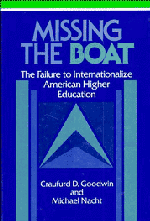Book contents
- Frontmatter
- Contents
- Introduction
- 1 Higher education looks abroad: historical trends
- 2 Who goes today? and who does not?
- 3 Individual costs and benefits
- 4 Campus attitudes
- 5 Obstacles to international experience
- 6 Issues for debate
- 7 Cases studies
- 8 Epilogue: missing the boat
- Appendix: institutions visited
- Index
4 - Campus attitudes
Published online by Cambridge University Press: 04 August 2010
- Frontmatter
- Contents
- Introduction
- 1 Higher education looks abroad: historical trends
- 2 Who goes today? and who does not?
- 3 Individual costs and benefits
- 4 Campus attitudes
- 5 Obstacles to international experience
- 6 Issues for debate
- 7 Cases studies
- 8 Epilogue: missing the boat
- Appendix: institutions visited
- Index
Summary
Faculty departures overseas occur within a climate of opinion that may affect the decision to go – and certainly will affect the traveler's reception on return. There are, of course, on any campus as varied a set of attitudes as the variety of characters who make up the academic community. Moreover, attitudes cannot easily be discerned from formal statements; rhetoric on this, as on many subjects, often departs widely from reality. Whenever possible on our travels, when exploring attitudes, we looked for evidence of action that confirmed the talk. For example, if a faculty body applauded international experience, we asked whether it also rewarded those who went abroad in the tenure and promotion process. When presidents or provosts testified to the importance of an international campus, did they also make the budget adjustments that were required to cause this to happen?
It did seem possible in some cases to pick up the ethos of an entire institution respecting the subject of our inquiry. For example, in one we encountered little but cynicism toward anything that occurred off its campus, let alone overseas. In this prestigious liberal arts college it was argued vehemently by the provost that the institution was essentially a “prep school for graduate school” with top-notch faculty and first-rate students. Any time spent by faculty away from the campus, except for specialized research trips, was fundamentally counterproductive to the basic mission of the institution.
- Type
- Chapter
- Information
- Missing the BoatThe Failure to Internationalize American Higher Education, pp. 53 - 65Publisher: Cambridge University PressPrint publication year: 1991

